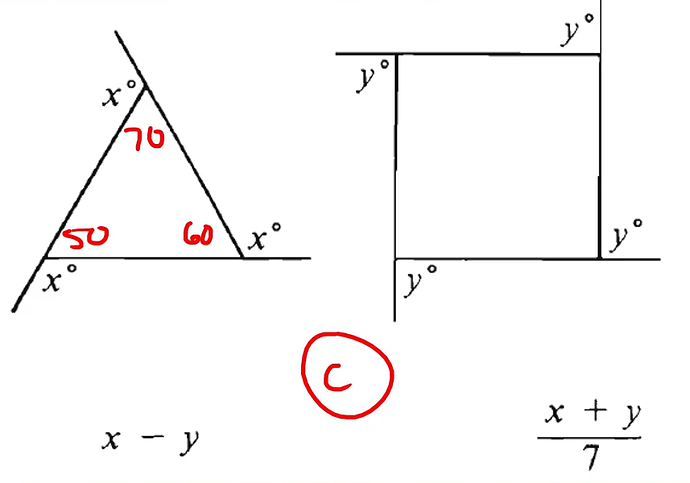I was going through the Angles, Lines and Polygons Practice video and I got stuck on the below question:
I don’t understand how the answer is C.
This is what I did:
I multiplied both quantity A and B by 7:
So quantity A is 7x-7y and Quantity B is x+y.
I then subtracted x and y for both the quantities:
So quantity A is 8x-8y and Quantity B is 0.
Now I need to find the values of x and y so I used the “exterior angle” property and got x=120. For y, I know that each angle inside the quadrilateral is (180-y). The sum of the interior angles of a quadrilateral is 360 so my equation is: 4*(180-y) = 360. y=90
So now just substitute the values of x and y:
Quantity A: 8(120-90) = 240 > Quantity B:0 and hence I chose (A). Could someone explain what I did wrong?
https://www.khanacademy.org/math/geometry-home/geometry-shapes/angles-with-polygons/v/sum-of-the-exterior-angles-of-convex-polygon#:~:text=the%20sum%20of%20all%20exterior,is%20the%20number%20of%20angles.
Watch the video first!!
basically the sum of all the exterior angle of a convex polygon is equal to 360. Then your question becomes 3x = 360 or x = 120 , 4y = 360 then y = 90 . All that is left now is to substitute the values in Quantity A and B to get the answer C
2 Likes
I then subtracted x and y for both the quantities:
So quantity A is 8x-8y and Quantity B is 0.
The mistake you made is in the subtraction.
(7x - 7y) - (x + y) = 6x - 8y
not 8x - 8y
Btw, if you found the values of x and y, the easier approach is to just substitute them directly into A and B.
1 Like
Oh yes! Thank you!
And yes I should have directly substituted x and y in quantities A and B. Idk why I took such a long approach
